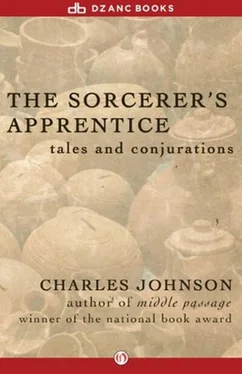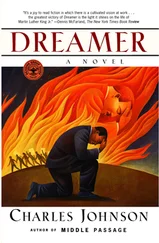Charles Johnson - Sorcerer's Apprentice
Здесь есть возможность читать онлайн «Charles Johnson - Sorcerer's Apprentice» весь текст электронной книги совершенно бесплатно (целиком полную версию без сокращений). В некоторых случаях можно слушать аудио, скачать через торрент в формате fb2 и присутствует краткое содержание. Год выпуска: 2014, Издательство: Dzanc Books, Жанр: Современная проза, на английском языке. Описание произведения, (предисловие) а так же отзывы посетителей доступны на портале библиотеки ЛибКат.
- Название:Sorcerer's Apprentice
- Автор:
- Издательство:Dzanc Books
- Жанр:
- Год:2014
- ISBN:нет данных
- Рейтинг книги:3 / 5. Голосов: 1
-
Избранное:Добавить в избранное
- Отзывы:
-
Ваша оценка:
- 60
- 1
- 2
- 3
- 4
- 5
Sorcerer's Apprentice: краткое содержание, описание и аннотация
Предлагаем к чтению аннотацию, описание, краткое содержание или предисловие (зависит от того, что написал сам автор книги «Sorcerer's Apprentice»). Если вы не нашли необходимую информацию о книге — напишите в комментариях, мы постараемся отыскать её.
Sorcerer's Apprentice — читать онлайн бесплатно полную книгу (весь текст) целиком
Ниже представлен текст книги, разбитый по страницам. Система сохранения места последней прочитанной страницы, позволяет с удобством читать онлайн бесплатно книгу «Sorcerer's Apprentice», без необходимости каждый раз заново искать на чём Вы остановились. Поставьте закладку, и сможете в любой момент перейти на страницу, на которой закончили чтение.
Интервал:
Закладка:
“Don’t touch that!” said Berkeley. “The fish have to eat, too! They can’t leave the tanks!”
Monkey, startled by the watchdog, looked at the wafers in his fist thoughtfully for a second, then crammed them into his mouth. “That’s their problem.”
Deep inside, Berkeley began a rumbling bark, let it build slowly, and by the time it hit the air it was a full-throated growl so frightening that Monkey jumped four, maybe five feet into the air. He threw the wafers at Berkeley. “Okay — okay, give it to ’em! But remember one thing, dog: You’re a mammal, too. It’s unnatural to take sides against your own kind.”
Scornfully, the watchdog turned away, trembling with fury. He snuffled up the wafers in his mouth, carried them to the huge, man-sized tanks, and dropped them in amongst the sea horses, gup-pies, and jellyfish throbbing like hearts. Goldfish floated toward him, his voice and fins fluttering. He kept a slightly startled expression. “What the hell is going on? Where’s Mr. Tilford?”
Berkeley strained to keep his voice steady. “Gone.”
“For good?” asked Goldfish. “Berkeley, we heard what the others said. They’ll let us starve—”
“No,” he said. “I’ll protect you.”
Goldfish bubbled relief, then looked panicky again. “What if Tilford doesn’t come back ever?”
The watchdog let his head hang. The thought seemed too terrible to consider. He said, more to console himself than Goldfish, “It’s his Shoppe. He has to come back.”
“But suppose he is dead, like Monkey says.” Goldfish’s unblinking, lidless eyes grabbed at Berkeley and refused to release his gaze. “Then it’s our Shoppe, right?”
“Eat your dinner.”
Goldfish called, “Berkeley, wait—”
But the watchdog was deeply worried now. He returned miserably to the front door. He let fly a long, plaintive howl, his head tilted back like a mountaintop wolf silhouetted by the moon in a Warner Brothers cartoon — he did look like that — his insides hurting with the thought that if Tilford was dead, or indifferent to their problems, that if no one came to rescue them, then they were dead, too. True, there was a great deal of Tilford inside Berkeley, what he remembered from his training as a pup, but this faint sense of procedure and fair play hardly seemed enough to keep order in the Shoppe, maintain the peace, and more important provide for them as the old man had. He’d never looked upon himself as a leader, preferring to attribute his distaste for decision to a rare ability to see all sides. He was no hero like Old Yeller, or the legendary Gellert, and testing his ribs with his teeth, he wondered how much weight he’d lost from worry. Ten pounds? Twenty pounds? He covered both eyes with his black paws, whimpered a little, feeling a failure of nerve, a soft white core of fear like a slug in his stomach. Then he drew breath and, with it, new determination. The owner couldn’t be dead. Monkey would never convince him of that. He simply had business elsewhere. And when he returned, he would expect to find the Shoppe as he left it. Maybe even running more smoothly, like an old Swiss watch that he had wound and left ticking. When the watchdog tightened his jaws, they creaked at the hinges, but he tightened them all the same. His eyes narrowed. No evil had visited the Shoppe from outside. He’d seen to that. None, he vowed, would destroy it from within.
But he could not be everywhere at once. The corrosion grew day by day. Cracks, then fissures began to appear, it seemed to Berkeley, everywhere, and in places where he least expected them. Puddles and pyramidal plops were scattered underfoot like traps. Bacterial flies were everywhere. Then came maggots. Hamsters gnawed at electrical cords in the storeroom. Frog fell sick with a genital infection. The fish, though the gentlest of creatures, caused undertow by demanding day-and-night protection, claiming they were handicapped in the competition for food, confined to their tanks, and besides, they were from the most ancient tree; all life came from the sea, they argued, the others owed them .
Old blood feuds between beasts erupted, too, grudges so tired you’d have thought them long buried, but not so. The Siamese began to give Berkeley funny looks, and left the room whenever he entered. Berkeley let him be, thinking he’d come to his senses. Instead, he jumped Rabbit when Berkeley wasn’t looking, the product of this assault promising a new creature — a cabbit — with jack-rabbit legs and long feline whiskers never seen in the Pet Shoppe before. Rabbit took this badly. In the beginning she sniffed a great deal, and with good reason — rape was a vicious thing — but her grief and pain got out of hand, and soon she was lost in it with no way out, like a child in a dark forest, and began organizing the females of every species to stop cohabiting with the males. Berkeley stood back, afraid to butt in because Rabbit said that it was none of his damned business and he was as bad as all the rest. He pleaded reason, his eyes burnt-out from sleeplessness, with puffy bags beneath them, and when that did no good, he pleaded restraint.
“The storeroom’s half-empty,” he told Monkey on the fifth day. “If we don’t start rationing the food, we’ll starve.”
“There’s always food.”
Berkeley didn’t like the sound of that. “Where?”
Smiling, Monkey swung his eyes to the fish-tanks.
“Don’t you go near those goldfish!”
Monkey stood at bay, his eyes tacked hatefully on Berkeley, who ground his teeth, possessed by the sudden, wild desire to bite him, but knowing, finally, that he had the upper hand in the Pet Shoppe, the power. In other words, bigger teeth. As much as he hated to admit it, his only advantage, if he hoped to hold the line, his only trump, if he truly wanted to keep them afloat, was the fact that he outweighed them all. They were afraid of him. Oddly enough, the real validity of his values and viewpoint rested, he realized, on his having the biggest paw. The thought fretted him. For all his idealism, truth was decided in the end by those who could be bloodiest in fang and claw. Yet and still, Monkey had an arrogance that made Berkeley weak in the knees.
“Dog,” he said, scratching under one arm, “you got to sleep sometime.”
And so Berkeley did. After hours of standing guard in the storeroom, or trying to console Rabbit, who was now talking of aborting the cabbit, begging her to reconsider, or reassuring the birds, who crowded together in one corner against, they said, threatening moves by the reptiles, or splashing various medicines on Frog, whose sickness had how spread to the iguana — after all this, Berkeley did drop fitfully to sleep by the front door. He slept greedily, dreaming of better days. He twitched and woofed in his sleep, seeing himself schtupping the little French poodle down the street, and it was good, like making love to lightning, she moved so well with him; and then of his puppyhood, when his worst problems were remembering where he’d buried food from Tilford’s table, or figuring out how to sneak away from his mother, who told him all dogs had cold noses because they were late coming to the Ark and had to ride next to the rail. His dream cycled on, as all dreams do, with greater and greater clarity from one chamber of vision to the next until he saw, just before waking, the final drawer of dream-work spill open on the owner’s return. Splendidly dressed, wearing a bowler hat and carrying a walking stick, sober, with a gentle smile for Berkeley (Berkeley was sure), Tilford threw open the Pet Shoppe door in a blast of wind and burst of preternatural brilliance that rayed the whole room, evaporated every shadow, and brought the squabbling, the conflict of interpretations, mutations, and internecine battles to a halt. No one dared move. They stood frozen like fish in ice, or a bird caught in the crosswinds, the colorless light behind the owner so blinding it obliterated their outlines, blurred their precious differences, as if each were a rill of the same ancient light somehow imprisoned in form, with being-formed itself the most preposterous of conditions, outrageous, when you thought it through, because it occasioned suffering, meant separation from other forms, and the illusion of identity, but even this ended like a dream within the watchdog’s dream, and only he and the owner remained. Reaching down, he stroked Berkeley’s head. And at last he said, like God whispering to Samuel: Well done . It was all Berkeley had ever wanted. He woofed again, snoring like a sow, and scratched in his sleep; he heard the owner whisper begun , which was a pretty strange thing for him to say, even for Tilford, even in a dream. His ears strained forward; begun , Tilford said again. And for an instant Berkeley thought he had the tense wrong, intending to say, “Now we can begin,” or something prophetically appropriate like that, but suddenly he was awake, and Parrot was flapping his wings and shouting into Berkeley’s ear.
Читать дальшеИнтервал:
Закладка:
Похожие книги на «Sorcerer's Apprentice»
Представляем Вашему вниманию похожие книги на «Sorcerer's Apprentice» списком для выбора. Мы отобрали схожую по названию и смыслу литературу в надежде предоставить читателям больше вариантов отыскать новые, интересные, ещё непрочитанные произведения.
Обсуждение, отзывы о книге «Sorcerer's Apprentice» и просто собственные мнения читателей. Оставьте ваши комментарии, напишите, что Вы думаете о произведении, его смысле или главных героях. Укажите что конкретно понравилось, а что нет, и почему Вы так считаете.












